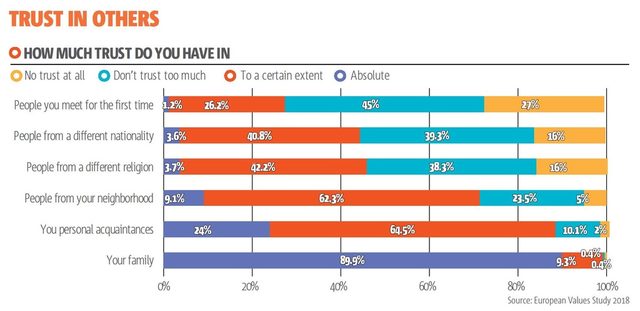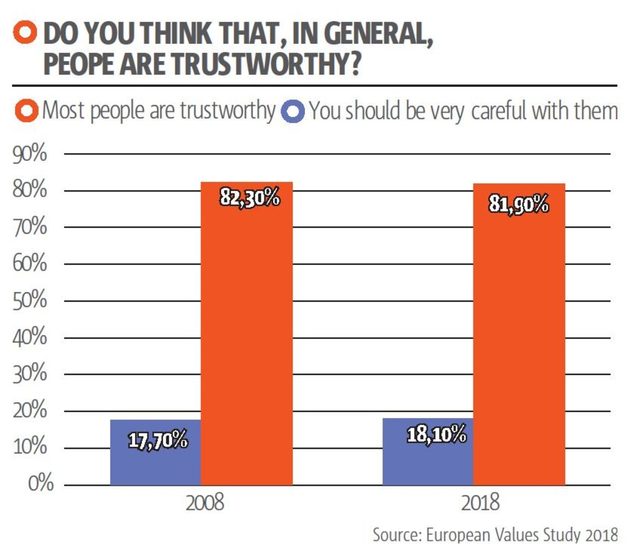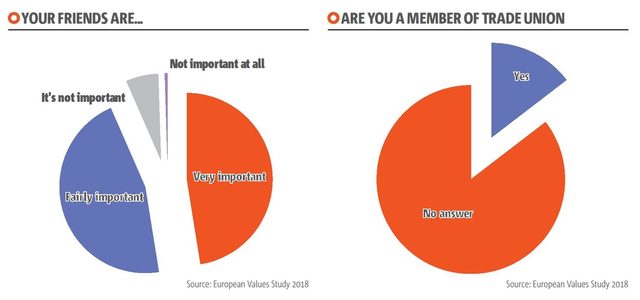Interpretation of sociological data is a peculiar art. The process could be very restrained, and only consider the most certain, explicit, and unequivocal reading of the numbers at hand. Alternatively, it could be performed with some license, and generate scenarios and hypotheses that have their departure in those same numbers, but are not 100% apparent. In this way, possible circumstances and tendencies for different probabilities can be played out.
Similar experiments are often worth performing. They have the capacity to pose practical questions: what would happen if the probabilities they present become facts?
I allowed myself some freedom in my evaluation of the 5th wave of the European Values Study. This does not mean it is an arbitrary assessment, but rather a controlled exploration of a similar possibility, a negative scenario that pertains to Bulgarian society.
Between 2008 and 2018, a slow increase in the significance of the immediate personal goals and the societal environment can be observed. There is a rise in the indicators concerning the importance of a person's job (by 3 points), leisure time (by 10 points), family (exceptionally high levels of trust - 89.9%), patriarchal values such as fidelity and children (between 3 and 6 points), friends and acquaintances. Even the numbers for satisfaction and happiness show some gain (between 1 and 4 points).


The importance of politics has decreased sharply, while the trust in institutions - judicial system, healthcare, education, remains at its traditional critically low level. To this we can add the minimal willingness for political activity, and minimal readiness to participate in lawful public protests (only 8% of citizens give a positive answer to this question).
This array of data points to a slow process of loss of social cohesion. Bulgarians are moving from mediated social links and values toward immediate, particular virtues, or in other words, they're moving from a national society (a large, complex, and mediated "imaginary" community), toward separate, immediate groups and small, "friendly" communities. What can be observed and is in close proximity to the individual's experience is what's valued. Importance is attached to relationships, values and solidarity which the individual can "touch".

Contrary to these hypothetical observations, we could discern the opposite process - a tendency that in a certain sense seems antagonistic. There is an increase in "prideful" patriotism, or the value that should unite the nation and society as a whole. All indicators of what's perceived as Bulgarian rise by 3-4 points. The most impressive rise is in the percentage of those who answered they're "very proud" of being Bulgarian - from 33.9% in 2008, to 47.1% in 2018. This goes hand in hand with a rise in xenophobia and social distancing from those perceived as being foreign and different, with a feeling of deficient participation in governance, with the traditional desire for a strong leader. In other words, here we have reasons to suspect that the prideful patriotism in question is actually national populism.
The question: "Here is a list of qualities which children can be encouraged to learn at home. Which, if any, do you consider to be especially important?" receives answers which we can well call alarming in 2018. They show a serious drop in the parents' desire to teach children altruism (from 31.4% to 14.4%), and imagination (from 24.4% to 20.2%). Once again, virtues that are in a sense patriarchal, immediate, and "visible" to the small community, gain at the expense of such "abstract" values. More and more parents would like their children to work hard, persevere and be responsible rather than altruistic and imaginative.
The bigger picture supports the hypothesis that Bulgarian society is losing its perception of distant social links (those that require that require "abstract" connections to people one doesn't personally know) as something valuable. Altruism and imagination are important and the decrease is far from harmless, as both values are a basic social "adhesive" in modern society and modern nation, fostering solidarity, a feeling of inclusiveness, identity, and social cohesion.
One can say that this is only a tendency, just a hypothesis, and maybe further research would dispel such apprehension. Or maybe the ship is sinking so slowly that we are unable to notice.
* Prof. Alexander Kiossev, Sofia University St. Kliment Ohridski
Interpretation of sociological data is a peculiar art. The process could be very restrained, and only consider the most certain, explicit, and unequivocal reading of the numbers at hand. Alternatively, it could be performed with some license, and generate scenarios and hypotheses that have their departure in those same numbers, but are not 100% apparent. In this way, possible circumstances and tendencies for different probabilities can be played out.
Similar experiments are often worth performing. They have the capacity to pose practical questions: what would happen if the probabilities they present become facts?












